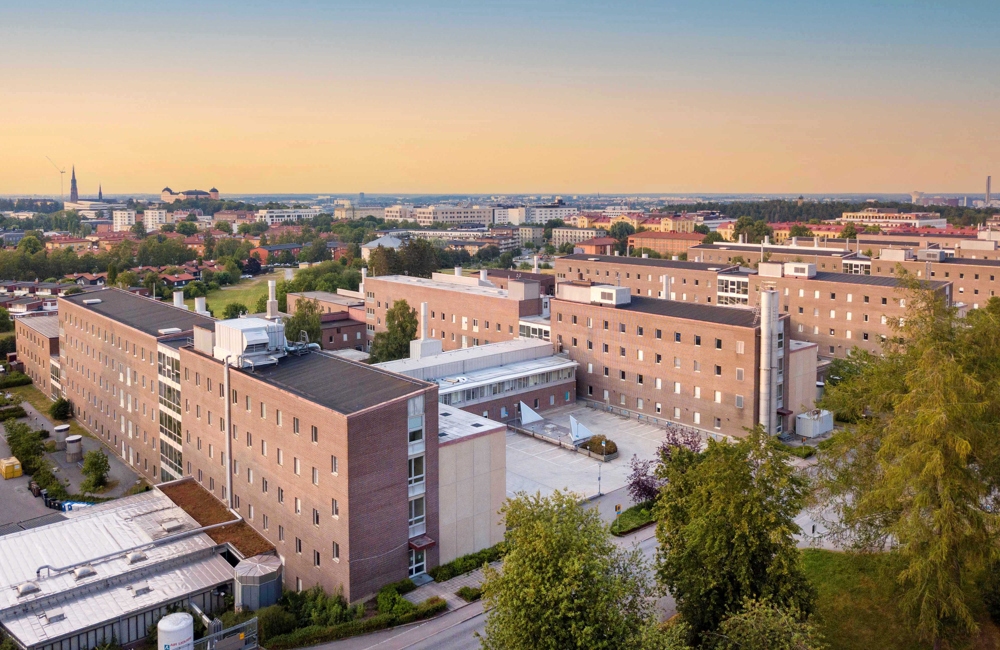Contact:
Akademiska Hus is modernising its largest building in Uppsala
Monday, 12 February 2024
The BMC, located in the southern part of central Uppsala, was built in stages from the late 1960s until 1985. Since then, the building has undergone several expansions and currently comprises over 105,000 square metres, primarily dedicated to laboratory and teaching facilities with associated offices and student areas. This location hosts approximately 1,500 employees and 4,500 students.
“Together with Uppsala University, we aim to ensure that the physical environment will be of high quality for many years, and that the BMC will continue to be an attractive campus. A large component of this effort involves making the building even more energy efficient, which is crucial to us and our goal of becoming climate neutral,” says Ali Ranji, project director at Akademiska Hus.
Energy savings of over 3 GWh
The BMC currently has about 10,000 windows that are nearly 40 years old and require updating to improve their energy performance and indoor comfort. Instead of installing new windows, Akademiska Hus has opted to keep the existing windows, but supplement them with additional energy-efficient glass, where necessary. Over a 30-year period, reusing the original windows will reduce climate impact by over 650,000 kilograms of carbon dioxide equivalents (CO2e) compared with purchasing new windows.
The exterior roofs have also been assessed and upgraded with new coating and insulation. The roofs have also been fitted with solar panels, with a total of almost 1,200 panels installed, that are expected to produce 440,000 kWh of sustainable electricity annually. A laboratory building like the BMC has high ventilation flows and is ventilated around the clock to maintain the right levels. The airflow has been optimised to reduce ventilation “stand-by losses” when the premises are vacant at night and on weekends. In total, the energy optimisations implemented in the BMC will reduce demand for district heating by almost 3.2 GWh annually, equivalent to the heating needs of approximately 320 homes.
More attractive public spaces and greener environments
The most significant visual changes can be found in the central and public spaces commonly frequented by students and visitors. Here, the entrances will be made more welcoming and the study spaces, currently on two floors, will be updated. The building’s bicycle parking areas will be redesigned to allow for green spaces with plants and furniture. The focus on outdoor environments will foster greater biodiversity, while enhancing opportunities for a healthy lifestyle by encouraging cycling and providing inviting outdoor areas for breaks.
New clinical training centre
In response to Uppsala University’s space requirements with the launch of a new education programme in autumn 2024, the BMC will also, at the initiative of the university, be equipped with a clinical training centre spanning approximately 1,600 m2. The facility will be an important component in the education programmes for physiotherapists, occupational therapists, pharmacists and doctors. In this setting, learning opportunities will be provided through training and role-playing exercises that simulate actual workplace environments and scenarios.
“Since its inception over 50 years ago, the BMC has been one of the largest biomedical research facilities in Europe. I find it highly commendable that Akademiska Hus and Uppsala University are jointly investing in upgrading this unique building instead of opting for new construction, particularly from sustainability and renewability perspectives. These investments will ensure that the BMC continues to be a landmark in life sciences, enabling us to conduct cutting-edge research and deliver high-quality education well into the future,” says Pontus Aspenström, administrator at the Biomedicial Centre.
The work to develop and modernise the BMC is underway, with completion expected in late 2024.